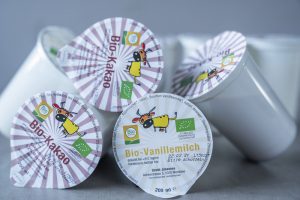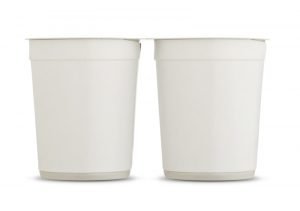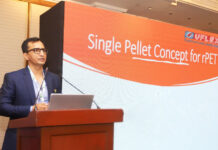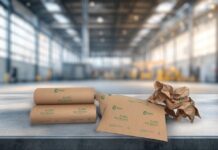School milk in Upper Austria is now packaged in 100% sustainable cups made of recycled PET (r-PET). The joint project of Austrian school milk producers and the three Upper Austrian companies Pet-Man, Starlinger viscotec, and Greiner Packaging is revolutionizing the food packaging market and proves that a sustainable circular economy is possible.
When the bell announces the break, children in Upper Austria look forward to enjoying their school milk. Every day, around 36,000 children in Upper Austria are supplied with fresh school milk products such as fruit milk, drinking yogurts, or school milk cocoa. “To carry through the original idea of the regional and sustainable product to the packaging, we thought about how to make it so that the cups are 100% recyclable and reusable,” explains Markus Neudorfer, Managing partner of the sheet manufacturer Pet-Man. The solution is a white cup made from 100% r-PET.
r-PET – the sustainable plastic
The benefits of this material are obvious – it is lightweight, unbreakable, and plasticizer-free, making it ideal for school kids. However, r-PET (recycled polyethylene terephthalate) is far more than conventional plastics. “The new r-PET cups consist of 100% recycled, unprinted r-PET mono-material and can be recycled over and over again into 100% food-grade cups,” says Alisa Schröer, responsible for Circular Economy projects at Greiner Packaging.

PET.
Recycling the cups requires less energy than reprocessing reusable glass, for example, and produces less waste. The school milk farmers take the used cups back with their next school milk delivery. This results in over 30% less CO2 emissions compared to reusable glass bottles. “The cups are collected, washed, and shredded. The shredded material, known as flakes, are then cleaned and processed using viscotec technology. This r-PET material will again be used to make cups for food packaging,” explains Herbert Hofbauer from Starlinger viscotec. As a result, many tons of packaging waste are avoided every year.
Regional product in regional packaging
The entire production and recycling loop of the school milk takes place in Upper Austria. The cows graze on local pastures and the fresh milk is bottled directly by the school milk farmers and delivered to the schools. “Thanks to the partnership with the three Upper Austrian companies Pet-Man, Starlinger viscotec, and Greiner Packaging, we can now provide a sustainably packaged school milk to the kindergartens and schools produced exclusively in Upper Austria.”, states Johannes Strobl, farmer, and chairman of the Upper Austrian school milk producers.
Closed packaging recycling loop
Children should be made aware of the sustainable use of nature as early as kindergarten and school age. By using the 100% recycled r-PET cups, they learn that plastic is not just plastic and makes it a big difference, whether the packaging is simply disposed of or can be recycled over and over again – the closed recycling loop of the valuable material makes recycled PET a material for the future.
It is interesting to know that recycled PET is currently the only post-consumer secondary plastic that is allowed to be used in food applications in the European Union. The school milk packaging made of r-PET can therefore be recycled again and turned into food packaging, making it THE recyclable packaging for dairy products.

The project has been nominated for the Green Packaging Star Award 2021 and TRIGOS 2021, Austrian award for responsible business, in the category “Exemplary project.”
The School Milk Program of Agrar Markt Austria (AMA) is part of the school program of the European Union for agricultural products like milk, fruit, and vegetables. It aims to help children and young people to eat a balanced and healthy diet. The school milk suppliers are almost exclusively regional direct marketers. 54 school milk producers in Austria, 18 of them in Upper Austria, bring their fresh products ordered directly to school or kindergarten.
Pet-Man GmbH in Frankenburg, Upper Austria, supplies food grade and environmentally friendly PET sheet made from post-consumer material. With an annual production capacity of 12,000 tons PET sheet, Pet-Man serves international customers in the packaging industry in the fields of food, medical and technical packaging.
Starlinger viscotec is a division of Starlinger GmbH, the enterprise in the field of machinery and complete lines for woven plastic packaging production. For 16 years, viscotec has been producing machines and plants for the refinement of recycled PET for food contact and extrusion lines for PET sheet made from up to 100 % rPET in St.Martin im Mühlkreis, Upper Austria, exporting these to customers worldwide. Starlinger PET recycling systems produce food-safe rPET and are approved for use in food applications by many brand owners as well as various national and international authorities. The worldwide sales and service support network and technical consulting service help customers to achieve optimum results in the manufacturing process.
Greiner Packaging is a leading European manufacturer of plastic packaging in the food and non-food sectors. The company has enjoyed a reputation for solutions expertise in the fields of development, design, production, and decoration for more than 60 years. Greiner Packaging responds to the challenges of the market with two business units – Packaging and Assistec. While the Packaging unit focuses on innovative packaging solutions, the Assistec unit is dedicated to producing custom-made technical parts. Greiner Packaging employs a workforce of nearly 4,900 at more than 30 locations in 19 countries around the world. In 2020, the company generated annual sales revenues of EUR 692 million (including joint ventures), which represents approximately 35 percent of Greiner’s total sales.











